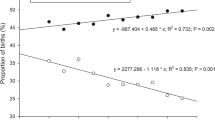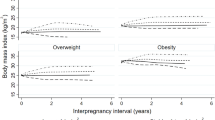Abstract
Excess gestational weight gain (GWG) may predispose mothers to becoming overweight or obese. The aim of this study was to investigate the association between GWG, according to the American Institute of Medicine (IOM) guidelines, and postpartum weight retention (PPWR). A cohort of 12,875 women from Nova Scotia, Canada with at least two consecutively recorded pregnancies was identified through a population-based perinatal database between 1993 and 2010. GWG was calculated as the difference between delivery and prepregnancy weights. PPWR, analyzed as a continuous variable in linear regression models, was calculated via interpregnancy weight change. Fifty eight percent of the total study population gained in excess of the IOM guidelines. Mean PPWR, adjusted for age and prepregnancy body mass index (BMI) among women with excess GWG was 5.0 kg (95 % CI 4.9–5.2), greater than women with adequate (2.1 kg, 95 % CI 1.8–2.3) or inadequate GWG (0.3 kg, 95 % CI 0–0.7). Effect modification by prepregnancy BMI was observed; the relationship between excess GWG and increased PPWR was observed in all prepregnancy BMI categories, yet was greatest among underweight women (7.5 kg, 95 % CI 6.6–8.3). Effect modification by parity was also observed; in contrast to multiparous women, primiparous women who gained in excess of GWG guidelines retained more postpartum weight (5.3 kg, 95 % CI 5.1–5.5 vs. 4.3 kg, 95 % CI 4.0–4.7). This study demonstrates that excess GWG is associated with an increase in the amount of weight retained after pregnancy. Interventions targeted to promote optimal GWG are warranted.





Similar content being viewed by others
References
Rasmussen, K. M., Yaktine, A. L., & Institute of Medicine (US) Committee to Reexamine IOM Pregnancy Weight Guidelines. (2009). Weight gain during pregnancy: Examining the guidelines. USA: The National Academies Press.
Health Canada (2010). Prenatal nutrition guidelines for health professions. [cited 12 Sept 2012]. http://www.hc-sc.gc.ca/fn-an/alt_formats/pdf/nutrition/prenatal/ewba-mbsa-eng.pdf..
Lowell, H., & Miller, D. C. (2010). Weight gain during pregnancy: adherence to Health Canada’s guidelines. Health Reports, 21(2), 31–36.
Kowal, C., Kuk, J., & Tamim, H. (2012). Characteristics of weight gain in pregnancy among Canadian women. Maternal and Child Health Journal, 16(3), 668–676.
Dummer, T. J. B., Kirk, S. F. L., Penney, T. L., Dodds, L., & Parker, L. (2012). Targeting policy for obesity prevention: identifying the critical age for weight gain in women. Journal of Obesity, 2012, 934895.
Nehring, I., Schmoll, S., Beyerlein, A., & Hauner, H. (2011). Gestational weight gain and long-term postpartum weight retention: A meta-analysis. The American Journal of Clinical Nutrition, 94(4), 1225–1231.
Siega-Riz, A. M., Viswanathan, M., Moos, M.-K., Deierlein, A., Mumford, S., Knaack, J., et al. (2009). A systematic review of outcomes of maternal weight gain according to the Institute of Medicine recommendations: Birthweight, fetal growth, and postpartum weight retention. American Journal of Obstetrics and Gynecology, 201(4), 339.e1–339.e14.
Begum, F., Colman, I., McCargar, L. J., & Bell, R. C. (2012). Gestational weight gain and early postpartum weight retention in a prospective cohort of Alberta women. Journal of Obstetrics and Gynaecology Canada, 34(7), 637–647.
Østbye, T., Krause, K. M., Swamy, G. K., & Lovelady, C. (2010). Effect of breastfeeding on weight retention from one pregnancy to the next: Results from the North Carolina WIC program. Preventive Medicine, 51(5), 368–372.
Gunderson, E. P., Abrams, B., & Selvin, S. (2000). The relative importance of gestational gain and maternal characteristics associated with the risk of becoming overweight after pregnancy. International Journal of Obesity, 24(12), 1660–1668.
Joseph, K. S., & Fahey, J. (2009). Validation of perinatal data in the discharge abstract database of the Canadian Institute for Health Information. Chronic Diseases in Canada, 29(3), 96–100.
Hediger, M. L., Scholl, T. O., Schall, J., & Krueger, P. M. (1997). Young maternal age and preterm labour. Annals of Epidemiology, 7(6), 400–406.
Rode, L., Kjærgaard, H., Ottesen, B., Damm, P., & Hegaard, H. K. (2012). Association between gestational weight gain according to body mass index and postpartum weight in a large cohort of Danish women. Maternal and Child Health Journal, 16(2), 406–413.
Bodnar, L. M., Siega-Riz, A. M., Simhan, H. N., & Himes, K. P. (2010). Severe obesity, gestational weight gain, and adverse birth outcomes. The American Journal of Clinical Nutrition, 91, 1642–1648.
World Health Organization (2006). WHO BMI Classification. [cited 7 Sept 2012]. http://apps.who.int/bmi/index.jsp?introPage=intro_3.html.
Szklo, M., & Nieto, F. J. (2004). Epidemiology beyond the basics. Boston: Jones and Bartlett Publishers.
Hanley, J. A., Negassa, A., Edwardes, M. D., & Forrester, J. E. (2003). Statistical analysis of correlated data using generalized estimating equations: An orientation. American Journal of Epidemiology, 157(4), 364–375.
Statistics Canada (2006). Table 109-0022 census indicator profile, Canada, provinces, territories, health regions (2011 boundaries) and peer groups every 5 years. [cited 11 Sept 2012]. http://www5.statcan.gc.ca/cansim/a26?lang=eng&retrLang=eng&id=1050502&paSer=&pattern=&stByVal=1&p1=1&p2=-1&tabMode=dataTable&csid=.
Zilko, C. E. M., Rehkopf, D., & Abrams, B. (2010). Association of maternal gestational weight gain with short- and long-term maternal and child health outcomes. American Journal of Obstetrics and Gynecology, 202(6), 574.e1–574.e8.
Oken, E., Taveras, E. M., Kleinman, K. P., Rich-Edwards, J. W., & Gillman, M. W. (2007). Gestational weight gain and child adiposity at age 3 years. American Journal of Obstetrics and Gynecology, 196(4), 322.e1–322.e8.
Amorim, A. R., Rössner, S., Neovius, M., Lourenço, P. M., & Linné, Y. (2007). Does excess pregnancy weight gain constitute a major risk for increasing long-term BMI? Obesity, 15(5), 1278–1286.
Mamun, A. A., Kinarivala, M., Williams, G. M., Najman, J. M., & Callaway, L. K. (2010). Associations of excess weight gain during pregnancy with long-term maternal overweight and obesity: Evidence from 21 y postpartum. The American Journal of Clinical Nutrition, 91(5), 1336–1341.
Lewis, C. E., Smith, D. E., Wallace, D. D., Williams, O. D., Bild, D. E., & Jacobs, D. R. (1997). Seven-year trends in body weight and associations with lifestyle and behavioral characteristics in black and white young adults: The CARDIA study. American Journal of Public Health, 87(4), 635–642.
Smith, D. E., Lewis, C. E., Cavenu, J., Perkins, L., Burke, G. L., & Bild, D. E. (1994). Longitudinal changes in adiposity associated with pregnancy study. JAMA, 271(22), 1747–1751.
Chasan-Taber, L., Schmidt, M. D., Pekow, P., Sternfeld, B., Solomon, C. G., & Markenson, G. (2008). Predictors of excessive and inadequate gestational weight gain in Hispanic women. Obesity, 16(7), 1657–1666.
Hedderson, M. M., Gunderson, E. P., & Ferrara, A. (2010). Gestational weight gain and risk of gestational diabetes mellitus. Obstetrics and Gynecology, 115(3), 597–604.
Oken, E., Kleinman, K. P., Belfort, M. B., Hammitt, J. K., & Gillman, M. W. (2009). Associations of gestational weight gain with short- and longer-term maternal and child health outcomes. American Journal of Epidemiology, 170(2), 173–180.
Statistics Canada (2011). Table 105-0502 Health indicator profile, two year period estimates, by age group and sex, Canada, provinces, territories, health regions (2011 boundaries) and peer groups [Internet]. [cited 12 Sept 2012]. http://www5.statcan.gc.ca/cansim/pick-choisir?lang=eng&p2=33&id=1050502.
Villamor, E., & Cnattingius, S. (2006). Interpregnancy weight change and risk of adverse pregnancy outcomes: A population-based study. Lancet, 368(9542), 1164–1170.
Pole, J. D., & Dodds, L. (1999). Maternal outcomes associated with weight change between pregnancies. Canadian Journal of Public Health, 90(4), 233–236.
Thangaratinam, S., Rogozinska, E., Jolly, K., Glinkowski, S., Roseboom, T., Tomlinson, J. W., et al. (2012). Effects of interventions in pregnancy on maternal weight and obstetric outcomes: Meta-analysis of randomised evidence. BMJ, 344, e2088.
Gaudet, L. M., Gruslin, A., & Magee, L. A. (2011). Weight in pregnancy and its implications: What women report. Journal of Obstetrics and Gynaecology Canada, 33(3), 227–234.
Acknowledgments
CW is supported by an Izaak Walton Killam Establishment Grant. We are grateful to the Reproductive Care Program of Nova Scotia for their review of this project and the provision of data. We also thank Dr. Linda Dodds and John Fahey for their critical review of the manuscript before submission.
Author information
Authors and Affiliations
Corresponding author
Rights and permissions
About this article
Cite this article
Ashley-Martin, J., Woolcott, C. Gestational Weight Gain and Postpartum Weight Retention in a Cohort of Nova Scotian Women. Matern Child Health J 18, 1927–1935 (2014). https://doi.org/10.1007/s10995-014-1438-7
Published:
Issue Date:
DOI: https://doi.org/10.1007/s10995-014-1438-7




